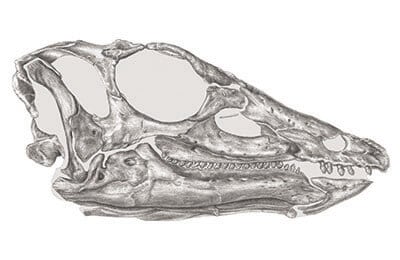New research published by a South Dakota School of Mines & Technology paleontologist has opened the door for future discoveries about one of the last non-avian dinosaurs to roam the planet 67 million years ago.
The Thesclelosauras neglectus was discovered more than a century ago, but little has been known about its life or relationships with other creatures of its time during the Cretaceous period in Western North America.
Clint Boyd, Ph.D., who has studied the skull of the T. neglectus since 2005, is the first to fully describe the dinosaur’s head. Knowing more about the skull will allow future research on the life of the ornithischian dinosaur, one of the last non-bird dinosaurs. Boyd’s paper, “The cranial anatomy of the neornithischian dinosaur Thesclelosauras neglectus,” was published today by the online scientific journal PeerJ.
Named after being neglected for nearly 20 years, T. neglectus roughly translates to “marvelous, neglected lizard.” The original specimen was found in 1891 but wasn’t studied or named until 1913.
Although the average 12-foot-long body of this herbivorous dinosaur was originally described in 1913, little was known about the structure of its head until now.
“The skulls of these animals give us the most insight into their relationships with other dinosaurs. Having the entire skull described provides insight not only into the broader relationships of this species, but also new insights into the early evolution of all ornithischian dinosaurs,” said Boyd, a post-doctoral fellow and assistant professor in the Department of Geology & Geological Engineering at SD Mines. The full description of the skull also allows researchers to study the diet and brain structure of this species in greater detail.
Bones from the T. neglectus are known from Wyoming, South Dakota, North Dakota and Western Canada. There are also possible fossils from California and Alaska.
The two specimens studied by Boyd were found by private individuals in Harding and Dewey Counties in South Dakota.
Boyd, who is now working on a complete revision of the relationships of ornithischian dinosaurs using data from this study, identified a possible relationship between this species and similar dinosaurs known from Asia and Canada, suggesting a dispersal between these continents during the Cretaceous period.
The skull found in Harding County is roughly 99 percent complete and now resides at the North Carolina Museum of Natural Sciences in Raleigh, N.C. The other skull, roughly 68 percent complete, remains in South Dakota at the Timber Lake and Area Museum. Read Boyd’s full paper online at https://peerj.com/articles/669/.


